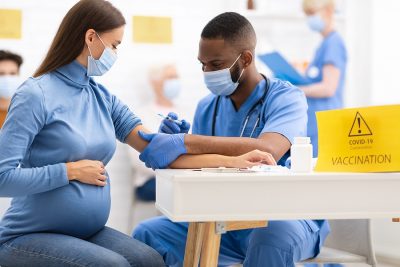Unlike UK, U.S. FDA Allows Pregnant and Nursing Women to Receive Experimental Pfizer COVID Vaccine

The U.S. FDA has given emergency use authorization (EUA) to the experimental Pfizer COVID mRNA vaccine, a type of vaccine that has never before been authorized for use in humans.
The FDA’s EUA for the Pfizer COVID vaccine follows an emergency use authorization in the U.K. about 10 days ago.
Both governments have issued guidelines for the new vaccines, one set of guidelines for doctors and healthcare providers who will administer the vaccine, and a shorter set of guidelines for “recipients” who plan on taking the vaccine.
Even though these guidelines cover the same vaccine from the same company (Pfizer), there are notable differences.
The UK guidelines, issued by the UK Department of Health and Social Care and the Medicines & Healthcare products Regulatory Agency, give strict warnings to doctors NOT to give the vaccine to women who are pregnant or nursing, or to women planning on becoming pregnant, with a warning about potential infertility issues.
4.6 Fertility, pregnancy and lactation
Pregnancy
There are no or limited amount of data from the use of COVID-19 mRNA Vaccine BNT162b2. Animal reproductive toxicity studies have not been completed. COVID-19 mRNA Vaccine BNT162b2 is not recommended during pregnancy. For women of childbearing age, pregnancy should be excluded before vaccination. In addition, women of childbearing age should be advised to avoid pregnancy for at least 2 months after their second dose.Breast-feeding
It is unknown whether COVID-19 mRNA Vaccine BNT162b2 is excreted in human milk. A risk to the newborns/infants cannot be excluded. COVID-19 mRNA Vaccine BNT162b2 should not be used during breast-feeding.Fertility
It is unknown whether COVID-19 mRNA Vaccine BNT162b2 has an impact on fertility. (Source.)
Unfortunately, the U.S. FDA’s guidelines for doctors (at the time of this writing) contain no such warning to not give the Pfizer experimental COVID vaccine to pregnant, lactating, or women trying to become pregnant.
11.1 Pregnancy
Risk Summary
All pregnancies have a risk of birth defect, loss, or other adverse outcomes. In the US general population, the estimated background risk of major birth defects and miscarriage in clinically recognized pregnancies is 2% to 4% and 15% to 20%, respectively. Available data on Pfizer-BioNTech COVID-19 Vaccine administered to pregnant women are insufficient to inform vaccine-associated risks in pregnancy.
11.2 Lactation
Risk Summary
Data are not available to assess the effects of Pfizer-BioNTech COVID-19 Vaccine on the breastfed infant or on milk production/excretion. (Source.)
The FDA’s Recipient Guidelines simply tells pregnant and lactating women to discuss it with their healthcare provider.
WHAT IF I AM PREGNANT OR BREASTFEEDING?
If you are pregnant or breastfeeding, discuss your options with your healthcare provider. (Source.)
Nothing is discussed or recommended for women planning to become pregnant, unlike the UK guidelines that tell women not to become pregnant for two months following the second dose, and informing doctors that the future effect on fertility is “unknown.”
FDA Warnings on the Pfizer COVID Vaccine: Acute Anaphylactic Reactions Expected
While there are no warnings in the FDA’s guidelines for the experimental Pfizer COVID vaccine for pregnant and nursing women, there are plenty of other warnings.
First, they make it very clear that this is an “unapproved” vaccine. From the FDA’s Recipient Guidelines:
The Pfizer-BioNTech COVID-19 Vaccine is an unapproved vaccine that may prevent COVID-19. There is no FDA-approved vaccine to prevent COVID-19.
HAS THE PFIZER-BIONTECH COVID-19 VACCINE BEEN USED BEFORE?
The Pfizer-BioNTech COVID-19 Vaccine is an unapproved vaccine. In clinical trials, approximately 20,000 individuals 16 years of age and older have received at least 1 dose of the Pfizer-BioNTech COVID-19 Vaccine.
WHAT ARE THE BENEFITS OF THE PFIZER-BIONTECH COVID-19 VACCINE?
In an ongoing clinical trial, the Pfizer-BioNTech COVID-19 Vaccine has been shown to prevent COVID-19 following 2 doses given 3 weeks apart. The duration of protection against COVID-19 is currently unknown. (Source.)
In short, the FDA is allowing Pfizer to use the American public as lab rats to further study this vaccine.
Warnings in the FDA’s guidelines for doctors:
Contraindications
Do not administer Pfizer-BioNTech COVID-19 Vaccine to individuals with known history of a severe allergic reaction (e.g., anaphylaxis) to any component of the Pfizer-BioNTech COVID-19 Vaccine (see Full EUA Prescribing Information).
Warnings
Appropriate medical treatment used to manage immediate allergic reactions must be immediately available in the event an acute anaphylactic reaction occurs following administration of Pfizer-BioNTech COVID-19 Vaccine.
Immunocompromised persons, including individuals receiving immunosuppressant therapy, may have a diminished immune response to the Pfizer-BioNTech COVID-19 Vaccine.
Pfizer-BioNTech COVID-19 Vaccine may not protect all vaccine recipients.
Adverse Reactions
Adverse reactions following the Pfizer-BioNTech COVID-19 Vaccine that have been reported in clinical trials include injection site pain, fatigue, headache, muscle pain, chills, joint pain, fever, injection site swelling, injection site redness, nausea, malaise, and lymphadenopathy (see Full EUA Prescribing Information).
Severe allergic reactions have been reported following the Pfizer-BioNTech COVID-19 Vaccine during mass vaccination outside of clinical trials.
Additional adverse reactions, some of which may be serious, may become apparent with more widespread use of the Pfizer-BioNTech COVID-19 Vaccine.
Serious adverse events are defined as:
• Death;
• A life-threatening adverse event;
• Inpatient hospitalization or prolongation of existing hospitalization;
• A persistent or significant incapacity or substantial disruption of the ability to conduct normal life functions;
• A congenital anomaly/birth defect;
• An important medical event that based on appropriate medical judgement may jeopardize the individual and may require medical or surgical intervention to prevent one of the outcomes listed above. (Source.)
Since the Pfizer COVID vaccine is supposed to be distributed through the nation’s Walgreens and CVS retail stores, will all of these stores have physicians and paramedics standing by to treat the patients who go into anaphylactic shock?
Or is the military going to be at all of these stores providing medics to handle that?
To get the latest version of these guidelines, visit the FDA website here.
Everyone should contact their federal representatives in the Senate and the House and demand that the FDA include the same warnings for pregnant and nursing women as the UK guidelines to the same vaccine contain!
*
Note to readers: please click the share buttons above or below. Forward this article to your email lists. Crosspost on your blog site, internet forums. etc.
Featured image is from Health Impact News
*** This article has been archived for your research. The original version from Global Research can be found here ***


